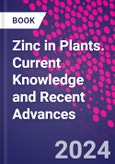Zinc in Plants: Current Knowledge and Recent Advances addresses zinc hunger, the transport of zinc in the soil-plant interphase, zinc and abiotic stress in plants, and zinc and plant disease. Written by experts in the field, this title is an essential resource to all scientists and students interested in plant physiology, biochemistry and agriculture. During their life, plants encounter various challenges, including their normal development under changing environmental conditions. Zinc (Zn) is an essential component of thousands of proteins in plants, although it is toxic in excess, and is essential for many processes throughout the plant lifecycle.
Please Note: This is an On Demand product, delivery may take up to 11 working days after payment has been received.
Table of Contents
1. Origin, behaviour and chemistry of Zinc in Soil2. Bioavailability of zinc
3. The problem of zinc hunger
4. Forms and functions of Zinc in Soils and Environment
5. Mechanisms of action of Zinc with Soil and its Components
6. Zinc deficiency/toxicity in soil and plants: Cause and remediation
7. Form and Function of Zinc in Plants: An comprehensive overview
8. Mechanisms of Zn in the soil-plant interphase: Role and regulation
9. Forms and Functions of Zinc with other plant nutrients: Signaling and Crosstalk
10. The contribution of Rhizosphere in the Supply of Zinc to Plants
11. Forms and Functions of Zinc Toxicity: a brief overview on recent developments
12. Zinc nutrition to animals and humans: Recent developments
13. Zinc and plant signaling molecules: special emphasis on ROS and RNS
14. Zinc Fertilizers: in soil, plant and animals
15. Distribution and Transports of Zn in the soil-plant interphase
16. Genotypic Variation in Zinc Uptake and Utilization by Plants
17. Zinc and plant hormones: an updated overview
18. Zinc and protective chemical agents in plants under changing environment
19. Zinc and plant disease: role and regulation
20. Zinc nanoparticles and plant biology: Realty and myth
21. Zinc and abiotic stress tolerance in plants
22. Zinc and photosynthesis of plants under changing environment
23. Zinc and status of reactive oxygen and reactive nitrogen species in plants
24. Supply of Zinc and VOC signalling: a brief overview of plant responses
25. Zinc research in soil, plant and human life: current status and future perspectives
Authors
Durgesh Kumar Tripathi Amity University Uttar Pradesh.Dr. Durgesh Kumar Tripathi is currently an Associate Professor at Amity Institute of Organic Agriculture, Amity University Uttar Pradesh, Noida, India. He is the recipient of 'Dr DS Kothari Post-Doctoral Fellowship' of the UGC, New Delhi. Dr. Tripathi has received his D.Phil. in Science from University of Allahabad, India. During this period, Dr. Tripathi worked extensively on phytolith analysis, crop stress physiology, agro-nanotechnology and molecular biology. He has expertise on laser spectroscopy. His research interests encompass stress tolerance mechanisms in plants. Presently, he is working with nano-materials and their interactions with plants to find out their detoxification mechanisms, he is also working on Silicon, Nitric oxide and hormonal crosstalk against abiotic stress in plants.
Vijay Pratap Singh Assistant Professor, Department of Botany, Chaudhary Mahadeo Prasad College, Allahabad, UP, India. Dr. Singh obtained his PhD from the University of Allahabad on topic "Oxidative stress and antioxidant system in some cyanobacteria simultaneously exposed to UV-B and heavy metal.� He has authored 102 publications, as well as editorials in reputed journals. His area of research interest is the role of nitric oxide and hydrogen sulphide signalling in the regulation of abiotic stress in plants. Dr. Singh is also working as an editor and reviewer of several reputed international journals.Vijay Pratap Singh is an Assistant Professor, Department of Botany C.M.P. Post Graduate College, University of Allahabad, India. Dr. Singh has obtained his D.Phil. degree from University of Allahabad. He has authored 95 publications including book chapters and editorials in reputed journals. He has edited several books with Elsevier, Wiley, CRC Press, Nova Publisher, Studium Press, etc. His area of research interest is regulation of abiotic stress in plants with special emphasis on nitric oxide, hydrogen sulfide, reactive oxygen species and phytohormonal signaling. Dr. Singh is also working as an editor and reviewer of reputed international journals. Sangeeta Pandey Assistant Professor, Amity Institute of Organic Agriculture, Amity University Uttar Pradesh, Noida, India.. Dr. Sangeeta Pandey is currently working as an Assistant Professor at Amity Institute of Organic Agriculture, Amity University Uttar Pradesh, Noida, India. She was awarded the Post-Doctoral Fellowship of the UGC, New Delhi. She is currently working on plant-growth promoting bacteria and nano-particles. She has published more than 25 papers in International journals and authored one book. She has also completed two projects granted by the government of India. Shivesh Sharma Professor, Department of Biotechnology, Motilal Nehru National Institute of Technology, Allahabad, UP, India. Dr. Shivesh Sharma completed his master's degree and PhD in the field of microbiology. His research interests include environmental microbiology/biotechnology, plant-microbe interaction, and bio formulations. He has been involved in number of research projects, funded both externally (DBT, UGC, DST, MHRD) and internally in the fields of his research interests. He has more than 110 publications in different research journals and various book chapters to his credit. Devendra Kumar Chauhan Professor and Head of Department of Botany at the University of Allahabad, India. Devendra Kumar Chauhan is a Professor and Head of Department of Botany at the University of Allahabad, India. He has 35 years' worth of teaching experience, has edited 5 books and contributed 15 book chapters. He has 76 publications in total and is on the editorial board for 5 different journals, including the American Journal of Current Biology and Ethnobotany: International Journal of the Society of Ethnobotanists. His research interests include palaeobotany, evolutionary biology, phytoremediation, plant stress physiology and agro-nanotechnology.








